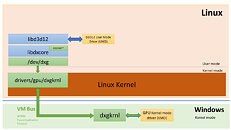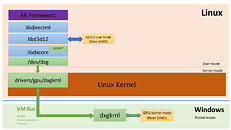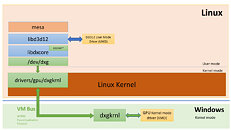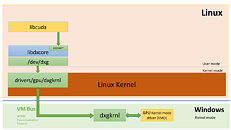Tuesday, May 19th 2020

DirectX Coming to Linux...Sort of
Microsoft is preparing to add the DirectX API support to WSL (Windows Subsystem for Linux). The latest Windows Subsystem for Linux 2 will virtualize DirectX to Linux applications running on top of it. WSL is a translation layer for Linux apps to run on top of Windows. Unlike Wine, which attempts to translate Direct3D commands to OpenGL, what Microsoft is proposing is a real DirectX interface for apps in WSL, which can essentially talk to hardware (the host's kernel-mode GPU driver) directly.
To this effect, Microsoft introduced the Linux-edition of DXGkrnl, a new kernel-mode driver for Linux that talks to the DXGkrnl driver of the Windows host. With this, Microsoft is promising to expose the full Direct3D 12, DxCore, and DirectML. It will also serve as a conduit for third party APIs, such as OpenGL, OpenCL, Vulkan, and CUDA. Microsoft expects to release this feature-packed WSL out with WDDM 2.9 (so a future version of Windows 10).
Source:
DirectX Blog
To this effect, Microsoft introduced the Linux-edition of DXGkrnl, a new kernel-mode driver for Linux that talks to the DXGkrnl driver of the Windows host. With this, Microsoft is promising to expose the full Direct3D 12, DxCore, and DirectML. It will also serve as a conduit for third party APIs, such as OpenGL, OpenCL, Vulkan, and CUDA. Microsoft expects to release this feature-packed WSL out with WDDM 2.9 (so a future version of Windows 10).




37 Comments on DirectX Coming to Linux...Sort of
Wine is what allows you to run some Windows applications in Linux. WSL facilitates virtualization of a Linux kernel in Windows, on top of which Linux applications can be run in Windows. I don't see how that relates to ditching Windows at all.
But why would someone run that kind of hybrid? Wouldn't it be better to just go fully Linux + Vulkan/OpenGL/whatever-API or fully Windows + DirectX?
I honestly don't get what's Microsoft's motive for doing this.
EDIT: Adding to the growing list of questions, would it be useful for VMs? Like, have a bunch of Linux VMs running inside HyperV and using this to expose DX features to the VM in a more direct way?
I am not impressed. If Microsoft released the DX API for use on Linux that would be amazing. But the subject of this article is simple nonsense. No one wants to run Linux software in Windows. The other way around, hell yes. This is yet another example of Microsoft having it's head firm lodged were the Sun doesn't shine.
While windows gets more brickage
I hope this'll be fixed in the 2004 release. I'm pretty lucky that my desktop takes all intensive tasks off my XPS, but not all developers can say the same.
and its by design that you don't have low level access with hyper-v turned on that is literally why it exists
using Linux is basically a continuous unpaid beta test lets not kid our selves there
windows 10 LTSB
Neither does it undergo "more" testing in that sense; it is the mission critical computer systems themselves that come as a package and are tested and verified. All LTSC needs to do is double check that those select few whole systems have no compatibility issues. It doesn't make any extra guarantees whatsoever for your built gaming or workstation PC, and shares standard drivers with the consumer editions.
The "unpaid beta testing" label applies to Arch, which most users tend to stay away from because it's the equivalent (if not more) of being on the fastest, most unpredictable Insider ring build. Ubuntu 20.04 LTS and all its derivatives are full featured releases that are neither comparable to insider builds nor LTSC in what they are.
Review for reference;
support.microsoft.com/en-us/help/13853/windows-lifecycle-fact-sheet
Windows 10 runs perfectly fine for vast majority of people I would say. Hundreds of millions of computers maybe?
I don't see mass exodus to Linux and macCrap headlines in newspapers.